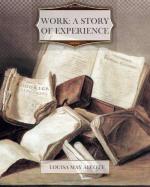But in spite of all annoyances she had never played better in her life. She liked the part, and acted the warm-hearted, quick-witted, sharp-tongued Peg with a spirit and grace that surprised even those who knew her best. Especially good was she in the scenes with Triplet, for Kent played the part admirably, and cheered her on with many an encouraging look and word. Anxious to do honor to her patron and friend she threw her whole heart into the work; in the scene where she comes like a good angel to the home of the poor play-wright, she brought tears to the eyes of her audience; and when at her command Triplet strikes up a jig to amuse the children she “covered the buckle” in gallant style, dancing with all the frolicsome abandon of the Irish orange-girl who for a moment forgot her grandeur and her grief.
That scene was her best, for it is full of those touches of nature that need very little art to make them effective; and when a great bouquet fell with a thump at Christie’s feet, as she paused to bow her thanks for an encore, she felt that she had reached the height of earthly bliss.
In the studio scene Lucy seemed suddenly gifted with unsuspected skill; for when Mabel kneels to the picture, praying her rival to give her back her husband’s heart, Christie was amazed to see real tears roll down Lucy’s cheeks, and to hear real love and longing thrill her trembling words with sudden power and passion.
“That is not acting. She does love St. George, and thinks I mean to keep him from her. Poor dear! I’ll tell her all about it to-night, and set her heart at rest,” thought Christie; and when Peg left the frame, her face expressed the genuine pity that she felt, and her voice was beautifully tender as she promised to restore the stolen treasure.
Lucy felt comforted without knowing why, and the piece went smoothly on to its last scene. Peg was just relinquishing the repentant husband to his forgiving wife with those brave words of hers, when a rending sound above their heads made all look up and start back; all but Lucy, who stood bewildered. Christie’s quick eye saw the impending danger, and with a sudden spring she caught her friend from it. It was only a second’s work, but it cost her much; for in the act, down crashed one of the mechanical contrivances used in a late spectacle, and in its fall stretched Christie stunned and senseless on the stage.
A swift uprising filled the house with tumult; a crowd of actors hurried forward, and the panic-stricken audience caught glimpses of poor Peg lying mute and pallid in Mabel’s arms, while Vane wrung his hands, and Triplet audibly demanded, “Why the devil somebody didn’t go for a doctor?”
Then a brilliant view of Mount Parnassus, with Apollo and the Nine Muses in full blast, shut the scene from sight, and soon Mr. Sharp appeared to ask their patience till the after-piece was ready, for Miss Douglas was too much injured to appear again. And with an unwonted expression of feeling, the little man alluded to “the generous act which perhaps had changed the comedy to a tragedy and robbed the beneficiary of her well-earned reward at their hands.”




